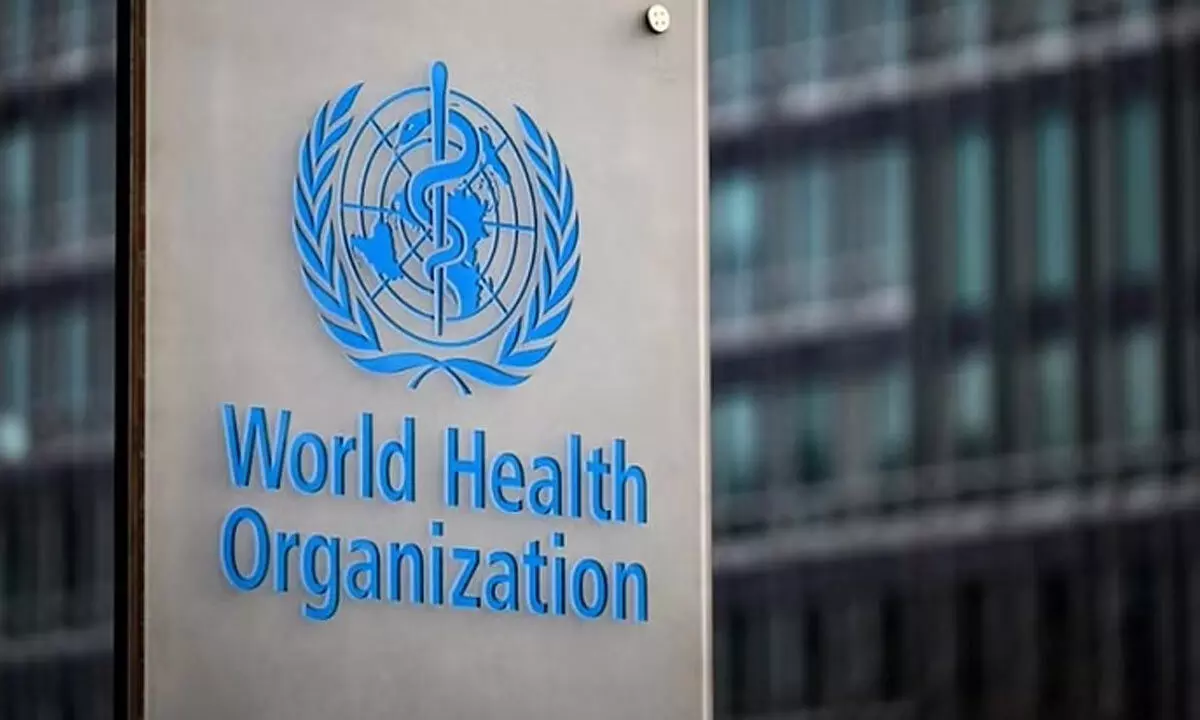Live
- ‘Bachhala Malli’ trailer heightens anticipation
- Karnataka quota row: Backward Class forum chief warns Lingayat seer over 'tinkering with reservations'
- Tight security arrangements at Group-II examination centers District SP
- Alia Bhatt captures attention in white
- Varun Dhawan talks about ‘Baby John’
- ‘Moonwalk’ trailer promises a quirky heist, love, and loyalty
- Combat leaf spot disease
- Ahsaas Channaopens up about her complex character in ‘Mismatched 3’
- Radhika Apte welcomes first child, shares heartfelt post
- Jacqueline dazzles at Da-Bangg Reloaded concert
Just In
WHO raises alarm on disease in flood-hit areas of Pakistan


World Health Organisation
The World Health Organisation raised the alarm Saturday about a "second disaster" in the wake of the deadly floods in Pakistan this summer, as doctors and medical workers on the ground race to battle outbreaks of waterborne and other diseases.
ISLAMABAD: The World Health Organisation raised the alarm Saturday about a "second disaster" in the wake of the deadly floods in Pakistan this summer, as doctors and medical workers on the ground race to battle outbreaks of waterborne and other diseases.
The floodwaters started receding this week in the worst-hit provinces but many of the displaced "now living in tents and makeshift camps " increasingly face the threat of gastrointestinal infections, dengue fever and malaria, which are on the rise.
The dirty and stagnant waters have become breeding grounds for mosquitos.
The unprecedented monsoon rains since mid-June, which many experts link to climate change, and subsequent flooding have killed 1,545 people across Pakistan, inundated millions of acres of land and affected 33 million people. As many as 552 children have also been killed in the floods.
"I am deeply concerned about the potential for a second disaster in Pakistan: a wave of disease and death following this catastrophe, linked to climate change, that has severely impacted vital health systems leaving millions vulnerable," WHO's director-general, Tedros Adhanom Ghebreyesus, said in a statement.
"The water supply is disrupted, forcing people to drink unsafe water," he said. "But if we act quickly to protect health and deliver essential health services, we can significantly reduce the impact of this impending crisis."
The WHO chief also said that nearly 2,000 health facilities have been fully or partially damaged in Pakistan and urged donors to continue to respond generously so that more lives can be saved.
Pakistani Prime Minister Shahbaz Sharif left for New York on Saturday to attend the first fully in-person gathering of world leaders at the UN General Assembly since the coronavirus pandemic. Sharif will appeal for more help from the international community to tackle the disaster.
Before his departure, Sharif urged philanthropists and aid agencies to donate baby food for children, along with blankets, clothes and other food items for the flood victims, saying they were desperately waiting for aid.
The southern Sindh and southwestern Baluchistan provinces have been the worst hit — hundreds of thousands in Sindh live now in makeshift homes and authorities say it will take months to completely drain the water in the province.
Nationwide, floods have damaged 1.8 million homes, washed away roads and destroyed nearly 400 bridges, according to the National Disaster Management Authority.
Imran Baluch, head of a government-run district hospital in Jafferabad, in the district of Dera Allah Yar in Baluchistan, said that out of 300 people tested daily, nearly 70% are positive for malaria.
After malaria, typhoid fever and skin infections are most commonly seen among the displaced, living for weeks in unhygienic conditions, Baluch told The Associated Press.
Pediatrician Sultan Mustafa said he treated some 600 patients at a field clinic established by the Dua Foundation charity in the Jhuddo area in Sindh, mostly women and children with gastrointestinal infections, scabies, malaria or dengue.
Khalid Mushtaq, heading a team of doctors from the Alkhidmat Foundation and the Pakistan Islamic Medical Association, said they are treating more than 2,000 patients a day and were also providing kits containing a month's supply of water-purification tablets, soaps and other items.
On Friday, the representative of the UN children's agency in Pakistan, Abdullah Fadil, said after visiting Sindh's flood-hit areas that an estimated 16 million children had been impacted by the floods.
He said UNICEF was doing everything it can to support children and families affected and protect them from the ongoing dangers of water-borne diseases.

© 2024 Hyderabad Media House Limited/The Hans India. All rights reserved. Powered by hocalwire.com






